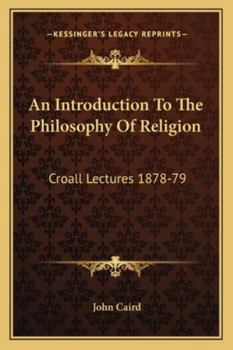An Introduction To The Philosophy Of Religion: Croall Lectures 1878-79
""An Introduction to the Philosophy of Religion: Croall Lectures 1878-79"" is a book written by John Caird, a Scottish philosopher and theologian. The book is based on the lectures Caird delivered at the University of Edinburgh in 1878-79, known as the Croall Lectures. The book provides an overview of the philosophy of religion, exploring the nature of religion, the relationship between religion and morality, and the arguments for and against the existence of God. Caird draws on a wide range of philosophical and theological traditions, including the works of Immanuel Kant, Friedrich Hegel, and the Christian scriptures.The book is divided into six chapters, each exploring a different aspect of the philosophy of religion. The first chapter discusses the nature of religion, exploring the different ways in which religion has been defined and the role that it plays in human life. The second chapter explores the relationship between religion and morality, examining the ways in which religious beliefs and practices can shape our moral values.The third chapter focuses on the arguments for and against the existence of God, exploring the different philosophical and theological approaches to this question. The fourth chapter discusses the problem of evil, exploring how the existence of evil in the world can be reconciled with the idea of a loving and all-powerful God.The fifth chapter explores the relationship between religion and science, examining the ways in which scientific discoveries can challenge religious beliefs and how religious beliefs can inform scientific inquiry. Finally, the sixth chapter discusses the role of religion in society, examining the ways in which religious beliefs and practices can shape culture, politics, and social institutions.Overall, ""An Introduction to the Philosophy of Religion: Croall Lectures 1878-79"" is a comprehensive and accessible introduction to the philosophy of religion, written by one of the most influential philosophers and theologians of the 19th century. It is a valuable resource for anyone interested in exploring the nature of religion and its role in human life.Croall Lectures, 1878-79.This scarce antiquarian book is a facsimile reprint of the old original and may contain some imperfections such as library marks and notations. Because we believe this work is culturally important, we have made it available as part of our commitment for protecting, preserving, and promoting the world's literature in affordable, high quality, modern editions, that are true to their original work.
Format:Paperback
Language:English
ISBN:1162974508
ISBN13:9781162974507
Release Date:September 2010
Publisher:Kessinger Publishing
Length:360 Pages
Weight:1.06 lbs.
Dimensions:0.8" x 6.0" x 9.0"
Customer Reviews
0 customer rating | 0 review
There are currently no reviews. Be the first to review this work.













